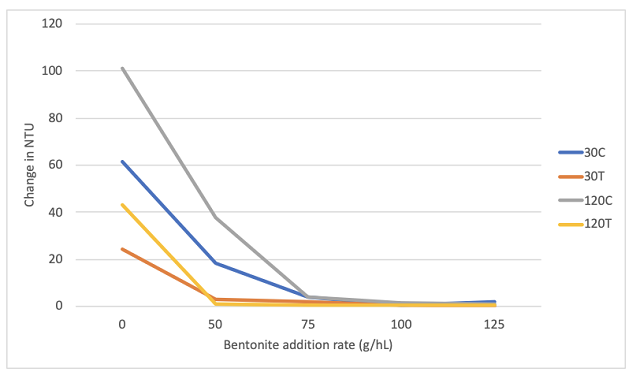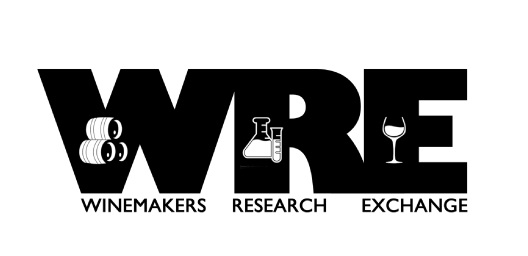Comparing results of a 30 minute benchtop test with a 120 minute test
Emily Pelton
Veritas Vineyard and Winery
The standard protein stability bench test at Veritas includes heating wine at 80°C for 2 hours, cooling, then reading the resulting difference in turbidity. Other Virginia wineries run the same test for 30 minutes. For this study, Veritas ran the trial twice, once at each time interval using two wines:
- Control: Sauvignon Blanc wine that received no bentonite during fermentation
- Treatment: Sauvignon Blanc wine that received 40 g/hL during fermentation

Table 4: Comparison of 30 minute and 2-hour incubations for benchtop protein stability tests
If stability is determined as a ∆NTU<2.0, the estimated treatment of bentonite needed for stability is as follows:
- 30 minute test, control wine: 75-100 g/hL
- 30 minute test, treatment wine: very near 75 g/hL
- 120 minute test, control wine: 75-100 g/hL
- 120 minute test, treatment wine: 50 g/hL

Figure 1: Change in NTU for Control and Treatment wines at two different incubation times
For the control wine, both tests predicted protein stability would be reached with a bentonite addition between 75-100 g/hL. The change in NTU is slightly higher for the 120 minute test, however this did not result in a change in predicted addition rate.
For the treatment wine, the 30 minute test predicted stability at 75 g/hL while the 120 minute test predicted stability at 50 g/hL. The difference in NTU for both tests at 50 and 75 g/hL is very small. These tests were not run as replicates, so some of these differences may be due to the known error rate of the test1.
The different in turbidity between heating times decreased as bentonite addition rates increased and was very similar at rates achieving stability. This finding is consistent with the idea that once unstable proteins are removed, it no longer matters how long they are denatured, they will not produce haze.
References
(1) Weiss, K. C.; Lange, L. W.; Bisson, L. F. Small-Scale Fining Trials: Effect of Method of Addition on Efficiency of Bentonite Fining. Am J Enol Vitic. 2001, 52 (3), 275–279.
